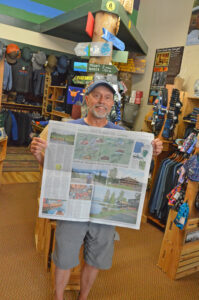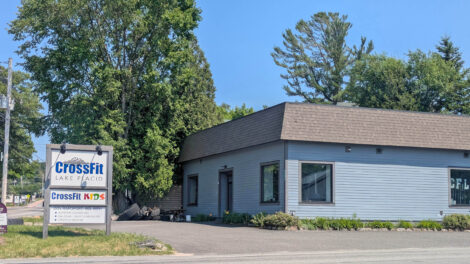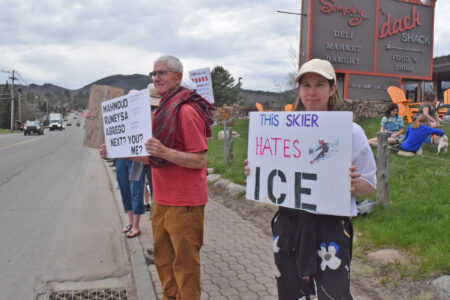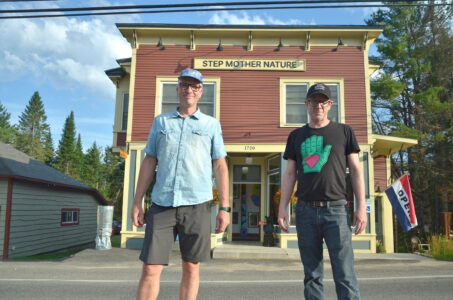Aiding reforestation in Lebanon
Adirondack researcher helps environmental campaign
- Ezra Schwartzberg, right, owner of Adirondack Research in Saranac Lake, stands near a landslide in the Bkassine Pine Forest in Lebanon with local resident and fire department member Maroun Aziz. The trees in the background are Pinus pinea, pine trees prized for their pine nuts. (Photo provided)
- Saranac Lake resident Ezra Schwartzberg, holding a copy of the Enterprise, stands with (right) members of the Morning Star Cooperative in El Mhaidthe, Lebanon, and (left) employees of the Lebanon Reforestation Initiative. The employees presented Schwartzberg with a gift of products produced by the cooperative using herbs and agricultural products grown by local producers or foraged on the village’s public lands. (Photo provided)

Ezra Schwartzberg, right, owner of Adirondack Research in Saranac Lake, stands near a landslide in the Bkassine Pine Forest in Lebanon with local resident and fire department member Maroun Aziz. The trees in the background are Pinus pinea, pine trees prized for their pine nuts. (Photo provided)
SARANAC LAKE — The owner of a local environmental consulting firm is putting his skills to work on a United Nations-funded study of reforestation efforts in Lebanon.
Ezra Schwartzberg of Saranac Lake-based Adirondack Research traveled to the Middle Eastern nation last fall. He’s working with the U.N. Food and Agriculture Office and the Lebanon Reforestation Initiative to study the economic impacts of climate change on reforestation programs in two areas of the country.
It’s the first big international project for Schwartzberg’s company, which is based out of a small office in the Keough Professional Building on St. Bernard Street. Formed four years ago after Schwartzberg and his family moved here from Wisconsin, Adirondack Research typically has two or three employees in addition to Schwartzberg. Its mission is to use science to inform decisions and to communicate science to influence policy.
“People need science to help make decisions, but more than that they need help letting the general public understand what the science means and how it’s useful in creating different policies,” Schwartzberg said.
Invasive species surveys for the U.S. Department of Agriculture and state Department of Environmental Conservation, creating a citizen science network through the Lake Placid Land Conservancy and conducting a scientific assessment of the Boreas Ponds tract are among some of the projects Adirondack Research has been involved in here.

Saranac Lake resident Ezra Schwartzberg, holding a copy of the Enterprise, stands with (right) members of the Morning Star Cooperative in El Mhaidthe, Lebanon, and (left) employees of the Lebanon Reforestation Initiative. The employees presented Schwartzberg with a gift of products produced by the cooperative using herbs and agricultural products grown by local producers or foraged on the village’s public lands. (Photo provided)
Schwartzberg said the opportunity to work abroad came through a colleague who is the project director of the Lebanon Reforestation Initiative. Based in Beirut, the program’s mission is to promote long-term sustainable reforestation across Lebanon by improving the connectivity of forests, giving wildlife a safer habitat, and empowering communities to work together to protect their forests and environment. The Lebanon Reforestation Initiative is a project funded by U.S. Agency for International Development and implemented by the U.S. Forest Service.
“The director there recommended me to the U.N. Food and Agriculture Office as a consultant to do a socioeconomic assessment of reforestation efforts in two target communities in Lebanon,” Schwartzberg said.
The first part of the project took place in October, when Schwartzberg traveled to the Bkassine Pine Forest and interviewed farmers, local leaders and workers involved in the pine nut industry.
“The forest is planted primarily with a species of pine tree called Pinus pinea,” Schwartzberg explained. “It was planted about 250 years ago. These trees produce pine nuts, and they’ll argue that these are the best pine nuts in the world. It’s a major industry in this town.”
Schwartzberg said the pine nut industry reminded him of the maple syrup industry here.
“You’ve got people here who are supplementing their yearly income by doing maple syrup,” he said. “In Lebanon, you’ve got a lot of people who have woodlots with these trees, and they hire people to come and collect the nuts, and they sell them to a pine nut cooperative that produces them. It’s kind of a cottage industry there.”
The other target site for Schwartzberg’s work is the hillsides of El Mhaidthe, where herbs and other plants that grow on public lands are collected by local residents and made into teas and jams that are sold through a food cooperative.
Schwartzberg said he wanted to know how valuable these industries are to local people, how much they use the resources, and how much money they make from what’s grown on the hillsides.
“Then the second part of this was asking people what they value about these public lands and how they use them,” he said. “The combination of those two sets of questions allows me to put a value on these natural habitats and also assess how much they will be affected because of climate change. Some of the main effects of climate change in that area are increased storm events and therefore increased erosion.”
“I wouldn’t call it a fear but there’s a definite acceptance and acknowledgment of the fact that climate change is going to influence their natural environment. In one of the two target sites in particular, in the Bkassine Pine Forest, there’s a fairly substantial landslide happening where they’re losing about 10 pine trees per year. That adds up to a lot of money because each pine tree produces over a kilo of finished product.”
In addition to his conversations and inter of local residents, Schwartzberg is also getting feedback from surveys of residents in each area he’s studying.
Schwartzberg said there’s a strong correlation between his work in Lebanon and projects Adirondack Research has been involved in here the Park.
“In order to promote initiatives of reforestation as we’re doing there, or public land use or trail access or forestry here, we need to have information about how it’s benefiting the general public and who’s using it and why,” he said. “Those are clear similarities between here and there. The other clear similarity is people are living in those communities and they’re using their natural resources as we are using our natural resources, and they value information on who’s using it and how to make their land management decisions.”
Now that he’s got this kind of work under his belt, Schwartzberg said he hopes it translates to similar opportunities elsewhere around the globe.
“The methodology I’m using for the project in Lebanon can be used in other parts of the world, too,” he said.






